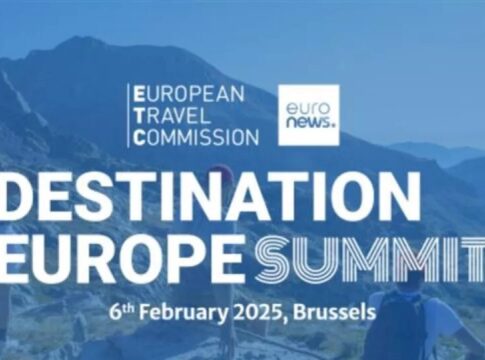Key stakeholders from the tourism sector gathered at the Destination Europe Summit, a pivotal event organized by the European Travel Commission, Booking.com, and Euronews. Hosted by Euronews anchor Meabh McMahon, the summit sparked dynamic discussions on harmonizing tourism expansion with regulation and sustainable investment.
Miguel Sanz, president of the European Travel Commission, highlighted tourism’s integral role in Europe’s cultural and economic fabric, asserting the need for the region to maintain its status as “the world’s favorite destination.” Sanz emphasized the importance of digital transformation within the travel sector, advocating for more online accessibility of attractions. However, he cautioned about the challenges of overtourism, warning that it “puts a strain on infrastructure, housing costs, and local communities.”
The Future of European Tourism: Strategies for 2026
Apostolos Tzitzikostas, the European Commissioner for Sustainable Transport and Tourism, delineated the EU’s tourism strategy for 2026. The strategy includes climate adaptation funding, digital transformation for SMEs, and robust infrastructure investment. Tzitzikostas stressed the necessity of simplifying access to funding for small and medium-sized enterprises, which are vital to the tourism industry. “We need to make things simpler, and we will,” he affirmed.
Challenges of Overregulation and Overtourism
Glenn Fogel, CEO of Booking.com, warned that excessive regulation might undermine Europe’s competitive edge. He proposed exploring pricing mechanisms to manage visitor numbers, though he insisted that governments should spearhead such initiatives. Fogel emphasized that as economies develop, overtourism issues could intensify, highlighting cities like Paris and Venice as examples.
Innovative Business Models and Tourism Management
Industry experts and policymakers shared insights on alternative revenue streams and tourism management strategies. Nikolina Brnjac, a European Parliament member, advocated for improved destination management plans, highlighting Croatia’s tourism tax on day visitors as a congestion relief measure. Daniel Attard underscored the importance of local community involvement in tourism decision-making, as not every region favors mass tourism.
Magda Kopczynska, EU Commission director general for mobility and transport, drew attention to the slow adoption of sustainable aviation fuels due to cost and production challenges. Olivier Jankovec from ACI EUROPE called for increased EU support to scale up sustainable aviation fuel production, vital for reducing reliance on energy imports.
Travel Demand and Emerging Trends
George Simon, EVP of Market Development for Europe at Mastercard, reported a record-breaking year for travel in 2024, with 7.4 billion global travelers. The overwhelming interest from Chinese tourists underscores Europe’s lasting appeal but also flags potential pressure on popular sites. Simon noted a trend toward longer leisure stays, benefiting local economies, and highlighted the economic boost from events like concerts, demonstrating their impact on tourism.
Ensuring Responsible Tourism Growth
The summit concluded with a focus on responsible tourism management. Sandra Carvao from UN Tourism stressed the need for benchmarking community perceptions to tackle seasonality and ensure tourism’s positive impact. Paul Kelly, CEO of Fáilte Ireland, highlighted Ireland’s high tourism approval ratings, emphasizing continuous community engagement.
Sérgio Gonçalves, a European Parliament member, echoed sustainability concerns, suggesting strategies like reducing airport charges to even out visitor flow year-round. He pointed to the challenges faced by island destinations in scaling up sustainable aviation fuel production, underscoring the importance of EU support.
Private Sector Calls for Tourism Sustainability
Zina Bencheikh, EMEA managing director at Intrepid Travel, called for restructuring Europe’s tourism infrastructure to align with sustainable business models, especially for SMEs dependent on peak-season earnings. She noted that catering to the over-55 demographic is a growing market segment.
Towards a Sustainable Tourism Future
Eduardo Santander, CEO of the European Travel Commission, closed the summit by emphasizing collaboration’s role in shaping a sustainable tourism future. “This momentum cannot be wasted,” he urged. “We want to be the best—not just in sustainability, but in accessibility and every aspect of tourism.”
The summit underscored a shared commitment to advancing tourism that balances growth with sustainability, ensuring Europe remains a leading global destination.


